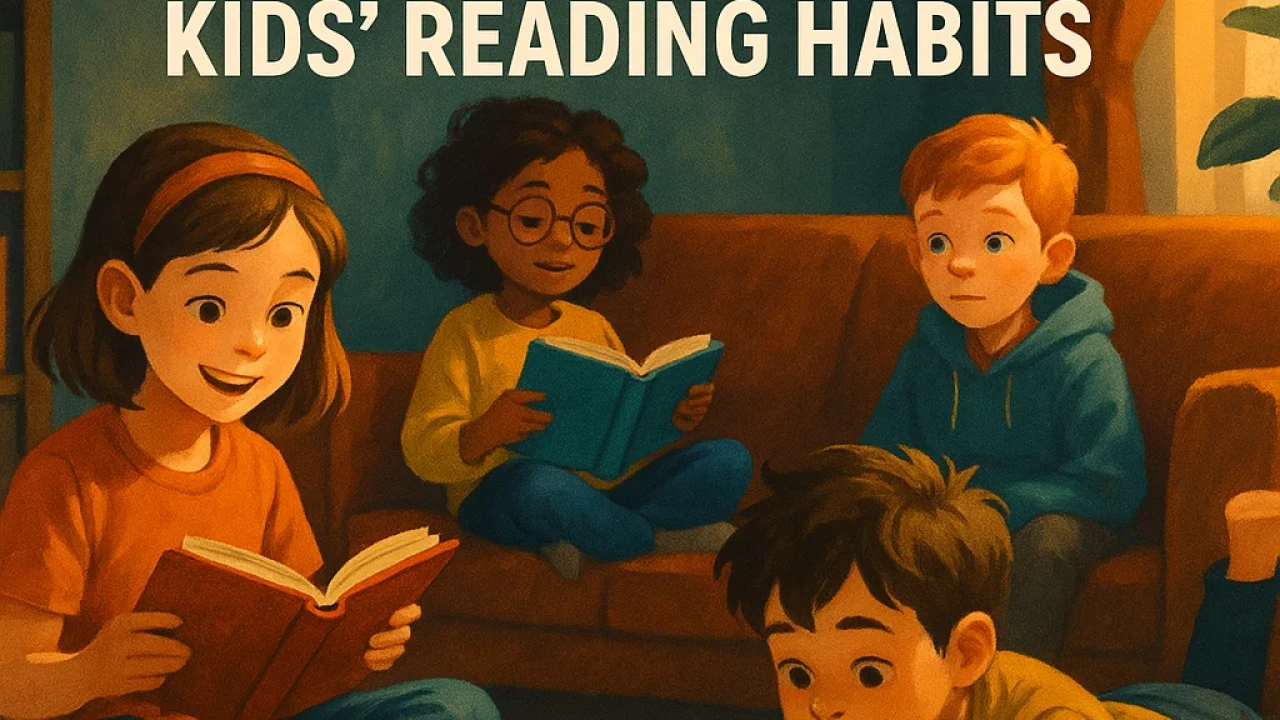
Effective Strategies for Encouraging Kids' Reading Habits
📑 Contents
Introduction

Encouraging kids' reading habits is a vital component of their development, influencing their academic success and personal growth. In our increasingly digital world, fostering a love for reading can sometimes feel like a challenge. However, there are effective strategies that can make this task enjoyable and fruitful for both parents and children. By creating a supportive reading environment and incorporating fun activities, you can help shape your child's relationship with books and reading.
Create a Reading-Friendly Environment

Establishing an inviting reading space is crucial for encouraging children to read. Here are some tips on how to create a cozy and accessible reading nook:
- Designate a space: Choose a quiet corner in your home where books can be easily accessed.
- Comfortable seating: Include cushions or a small chair to make the space inviting.
- Good lighting: Ensure the area has adequate lighting, whether natural or artificial.
- Book display: Use shelves or baskets to keep books organized and visible.
- Decorate with themes: Personalize the space with book-themed posters or your child’s favorite characters.
Age-Appropriate Book Selection
Choosing the right books for your child's age and interests is essential to cultivate their reading habits. Here’s how to pick suitable books:
- Know their interests: Talk to your child about what topics excite them.
- Explore different genres: Introduce various types of books, such as fiction, non-fiction, and poetry.
- Visit libraries: Utilize local libraries to discover new books and series.
- Ask for recommendations: Consult teachers or librarians for age-appropriate suggestions.
Incorporate Reading into Daily Routines

Making reading a regular part of your family’s routine can help instill this habit in children. Here are some effective ways to integrate reading into daily life:
- Read aloud: Set aside time each day for reading aloud together. This can be during breakfast, bedtime, or even car rides.
- Family reading hour: Designate a specific hour each week where everyone reads their own book.
- Connect reading to activities: Choose books related to upcoming events or activities, such as a trip to the zoo or baking cookies.
Use Technology Wisely
While traditional books have their merits, technology can also play a role in encouraging reading among kids. Consider these technological tools:
- eBooks: Use eReaders and tablets to access a wide variety of books.
- Educational apps: Explore apps that promote reading skills and comprehension through interactive storytelling.
- Online book clubs: Join virtual reading groups that encourage discussions about books.
Make Reading Fun

Transforming reading into a fun activity can significantly impact your child's willingness to engage with books. Here are some ideas:
- Reading rewards: Create a reward system where kids earn points or stickers for reading.
- Book-related games: Incorporate games like book bingo or trivia based on their favorite stories.
- Host themed parties: Celebrate the completion of a book with a themed event, such as a dress-up party based on the characters.
Encourage Discussions and Connections
Engaging in conversations about books can enhance comprehension and appreciation. Here’s how to encourage discussions:
- Ask open-ended questions: Encourage your child to share their thoughts by asking questions like, "What did you like about this character?"
- Connect to real life: Relate themes or lessons from the story to your child’s experiences.
- Explore adaptations: Discuss any film or series adaptations of the books they read.
Monitor Progress and Celebrate Achievements

Keeping track of your child’s reading progress can motivate them to continue reading. Here are some strategies to monitor and celebrate:
- Reading logs: Maintain a log of books read, including titles and dates.
- Set goals: Establish specific reading goals, such as a certain number of books per month.
- Celebrate milestones: Acknowledge when they finish a book or reach a goal with a small celebration.
Table: Recommended Books by Age Group
| Age Group | Recommended Titles | Author |
|---|---|---|
| 0-3 years | Goodnight Moon | Margaret Wise Brown |
| 4-7 years | The Very Hungry Caterpillar | Eric Carle |
| 8-12 years | Harry Potter and the Sorcerer's Stone | J.K. Rowling |
| 13+ years | The Hate U Give | Angie Thomas |
Conclusion

Encouraging kids' reading habits is a rewarding journey that can lead to lifelong benefits. By creating a supportive environment, incorporating reading into daily life, and making it enjoyable, you can instill a love for books in your child. Remember, every small step counts – whether it’s sharing a bedtime story or exploring new genres together. Start today, and watch your child flourish as they discover the joy of reading!
FAQs

1. How can I motivate my child to read more?
Try to incorporate reading into their daily routine, make it fun, and provide books that align with their interests.
2. What are some age-appropriate books for young children?
Books like "Goodnight Moon" and "The Very Hungry Caterpillar" are great for young children.
3. How often should I read with my child?
Aim for at least 15-30 minutes a day, but even short sessions can be beneficial.
4. Are eBooks as effective as traditional books?
eBooks can be just as effective; they offer convenience and can engage children through interactive features.
5. What are some good reading apps for kids?
Apps like Epic!, ABCmouse, and Starfall offer engaging educational content for children.
6. How can I help my child choose books?
Discuss their interests, visit libraries, and explore book recommendations together.
7. What are the benefits of reading aloud to my child?
Reading aloud enhances vocabulary, comprehension, and fosters a love for stories.
8. How can I celebrate my child's reading achievements?
Consider small rewards, special outings, or themed parties to celebrate their progress.











